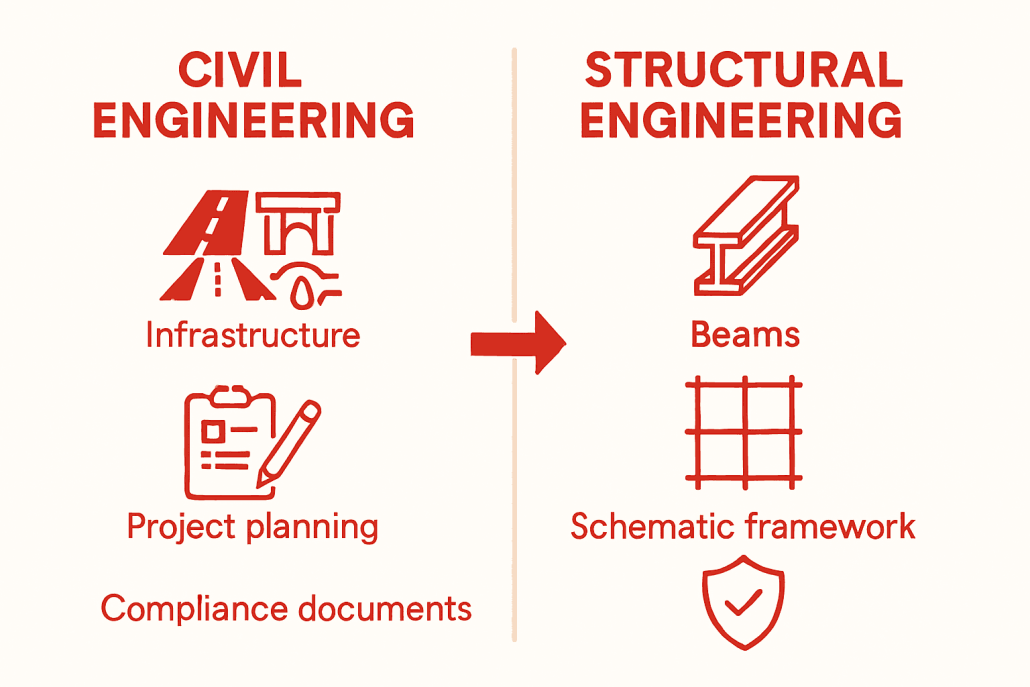Civil vs Structural Engineering: Complete Comparison Guide
Did you know that civil engineers design the infrastructure that keeps entire cities running, while structural engineers focus on making sure buildings and bridges stand strong? Over 90 percent of major construction projects require input from both civil and structural experts. Understanding the differences between these roles can help you make smarter decisions about design, safety, and compliance for your next building or infrastructure project.
Table of Contents
- Defining Civil and Structural Engineering Roles
- Core Areas And Key Responsibilities Compared
- Typical Applications In Residential And Commercial Projects
- Required Qualifications And Common Skill Sets
- Choosing The Right Service For Your Project
Key Takeaways
| Point | Details |
|---|---|
| Civil Engineering Scope | Civil engineers manage large-scale infrastructure projects and focus on environmental compliance and urban planning. |
| Structural Engineering Focus | Structural engineers specialize in the design and analysis of individual structures to ensure load-bearing capacity and safety against environmental forces. |
| Educational Pathways | Both disciplines require a bachelor’s degree in civil engineering, with opportunities for specialization and necessary certifications for professional practice. |
| Collaboration Importance | Successful projects often necessitate collaboration between civil and structural engineers to achieve effective, safe, and efficient design solutions. |
Defining Civil and Structural Engineering Roles
Civil engineering and structural engineering are two closely related yet distinct disciplines that play critical roles in designing and maintaining our built environment. According to research from the University of North Dakota, civil engineering broadly encompasses the design, construction, and maintenance of infrastructure systems like roads, bridges, water systems, and buildings.
Structural engineering emerges as a specialized sub-discipline within civil engineering, focusing specifically on analyzing and designing structures to ensure they can safely support various loads and withstand environmental forces. Structural engineers concentrate on the structural integrity of buildings, bridges, towers, and other physical constructions, calculating precise load-bearing capacities and designing frameworks that can resist wind, earthquakes, and other potential stressors.
- Civil engineers manage broader infrastructure systems
- Structural engineers focus on specific structural design and analysis
- Both disciplines require advanced mathematical and engineering skills
While civil engineers might develop comprehensive site plans and utility designs, structural engineers drill down into the microscopic details of how individual components connect and support entire structures. Their work ensures that everything from residential homes to massive skyscrapers can stand safely and securely under varying conditions.
Learn more about licensed civil engineering services to understand the depth and complexity of these critical engineering roles.
Core Areas and Key Responsibilities Compared
According to research from the University of North Dakota, civil engineers and structural engineers have distinct yet interconnected responsibilities that are crucial to developing safe and functional infrastructure. Civil engineers operate on a broader scale, managing comprehensive projects that require extensive environmental and regulatory considerations, while structural engineers concentrate on the precise technical details of individual building systems.
In practical terms, civil engineers tackle large-scale infrastructure challenges like designing transportation networks, water management systems, and urban development projects. They must consider complex factors such as environmental impact, land usage, public safety, and compliance with local and national regulations. Their work often involves creating comprehensive site plans that integrate multiple engineering disciplines and urban planning requirements.
**Key Responsibilities Comparison:
Here’s a side-by-side comparison of core responsibilities:
| Key Area | Civil Engineer Responsibilities | Structural Engineer Responsibilities |
|---|---|---|
| Project Focus | Infrastructure systems Site plans Urban planning |
Structural integrity Detailed design Load analysis |
| Typical Tasks | Transportation design Water systems Environmental compliance |
Framework design Resistance calculation Material selection |
| Scale of Work | Large, multi-system projects | Individual buildings and components |
| Environmental Role | Compliance Impact assessment |
Safety under forces Seismic/wind resistance |
| Regulator Liaison | Zoning Permits Public safety |
Building codes Industry standards |
- Civil Engineers:
- Design transportation infrastructure
- Develop water management systems
- Create comprehensive site plans
- Manage environmental compliance
- Structural Engineers:
- Analyze building load capacities
- Design structural frameworks
- Ensure building safety and integrity
- Calculate resistance to environmental forces
Structural engineers, by contrast, drill down into the microscopic engineering details of specific structures. Their primary focus is guaranteeing that individual buildings, bridges, and other constructions can safely withstand various loads and environmental challenges. They perform complex mathematical calculations to ensure structural integrity, using advanced computational tools to model potential stress scenarios and design frameworks that can resist wind, earthquakes, and other potential structural threats. Explore our licensed civil engineering services to understand how these critical engineering roles protect our built environment.
Typical Applications in Residential and Commercial Projects
According to research from the University of North Dakota, civil and structural engineers play pivotal roles in both residential and commercial projects, each bringing unique expertise to the built environment. In residential settings, these professionals collaborate to transform architectural designs into safe, functional living spaces that meet complex engineering requirements.
Residential Project Applications:
- Site preparation and grading
- Utility system design
- Foundation engineering
- Structural load calculations
- Drainage and water management
- Compliance with local building codes
Commercial projects demand even more sophisticated engineering approaches. Civil engineers develop comprehensive infrastructure plans that integrate complex utility systems, transportation networks, and environmental considerations. Structural engineers focus on creating robust frameworks for office buildings, industrial facilities, and public spaces that can withstand significant environmental and operational stresses.
Commercial Project Applications:
- Large-scale infrastructure planning
- Complex utility system design
- Multi-story building structural analysis
- Seismic and wind resistance engineering
- Advanced load-bearing calculations
- Environmental impact assessments
Whether designing a single-family home or a massive commercial complex, these engineers ensure that every structure is not just built, but engineered to provide maximum safety, functionality, and long-term durability. Explore our residential engineering services to understand how professional engineering transforms architectural visions into reality.
Required Qualifications and Common Skill Sets
According to research from the University of North Dakota, civil engineers typically begin their professional journey with a bachelor’s degree in civil engineering, with opportunities to specialize in diverse fields like transportation, environmental, or structural engineering. The educational pathway for these professionals demands a robust foundation in complex mathematical and scientific principles.
Key Educational Requirements:
- Bachelor’s degree in Civil Engineering
- Advanced degrees for specialized roles
- Professional Engineering (PE) license
- Continuous professional development
- Specialized certifications in specific engineering domains
Structural engineers, as a specialized subset of civil engineering, often pursue advanced degrees with intense focus on structural analysis, design principles, and complex computational modeling. Their skill set requires exceptional mathematical prowess, advanced computer-aided design (CAD) capabilities, and a deep understanding of material science and structural mechanics.
Critical Skill Sets for Both Disciplines:
- Advanced mathematical modeling
- Computational design skills
- Analytical problem-solving
- Detailed technical documentation
- Understanding of building codes and regulations
- Risk assessment and mitigation strategies
Beyond academic qualifications, successful civil and structural engineers must demonstrate exceptional communication skills, ability to collaborate across multidisciplinary teams, and a commitment to continuous learning in an ever-evolving technological landscape. Explore our professional engineering licensing services to understand the comprehensive journey of becoming a licensed engineering professional.

Choosing the Right Service for Your Project
According to research from the University of North Dakota, selecting the appropriate engineering service is critical to project success. The decision between civil and structural engineering services hinges on the specific scope, complexity, and technical requirements of your particular project.
When to Hire a Civil Engineer:
- Large-scale infrastructure development
- Urban planning and site design
- Comprehensive utility system planning
- Environmental impact assessments
- Municipal and public works projects
- Land development and zoning considerations
Structural engineering becomes essential when your project demands precise technical analysis of building integrity, load-bearing capacities, and complex structural design. These specialists are crucial for ensuring that individual structures can safely withstand environmental stresses, meet building codes, and provide long-term durability.
When to Hire a Structural Engineer:
- Residential and commercial building design
- Structural integrity assessments
- Foundation and framing engineering
- Seismic and wind resistance analysis
- Renovation and retrofitting projects
- Complex architectural design implementations
Ultimately, many projects require collaboration between both civil and structural engineers to achieve comprehensive, safe, and efficient design solutions. Learn more about our licensed engineering consultation services to determine the best approach for your specific project needs.
Solve Your Engineering Challenges with Trusted Experts
If you are comparing civil and structural engineering, you already know that choosing the right expertise for your project is a high-stakes decision. The difference between broad project oversight and precise calculations can mean the difference between success and critical problems down the line. Our team understands the unique pain points you face—from ensuring structural integrity and meeting local building codes to navigating complex drainage requirements, grading, and site plan development. Whether you need a comprehensive approach or focused technical guidance, we support both residential and commercial projects with unmatched attention to detail and compliance.

Why risk costly delays or design flaws? Act now to get expert guidance and tailored engineering plans that safeguard your investment. Visit Florida Licensed Engineers for a full suite of services, including structural, civil, and forensic engineering, permitting expeditor support, and more. You can also browse insights in the Uncategorized Archives – Georgia Licensed Engineers for related expertise. Let us turn your vision into a safe and successful reality—contact our trusted team today.
Frequently Asked Questions
What is the difference between civil engineering and structural engineering?
Civil engineering is a broader discipline that focuses on designing, constructing, and maintaining infrastructure systems like roads and bridges. Structural engineering is a specialized sub-discipline that concentrates specifically on the design and analysis of structures to ensure their integrity and safety under various loads.
What qualifications are required to become a civil or structural engineer?
To become a civil engineer, a bachelor’s degree in civil engineering is typically required, along with a Professional Engineering (PE) license. Structural engineers may pursue advanced degrees focusing on structural analysis and design, requiring similar foundational education and licensure.
When should I hire a civil engineer versus a structural engineer?
Hire a civil engineer for large-scale infrastructure projects, urban planning, and environmental assessments. In contrast, a structural engineer is essential for specific building designs, load analysis, and ensuring structural integrity against environmental forces.
What are the typical applications of civil and structural engineering in residential and commercial projects?
In residential projects, civil engineers manage site preparation and utility systems, while structural engineers focus on foundation engineering and load calculations. In commercial projects, civil engineers handle infrastructure planning, and structural engineers analyze and design frameworks for larger buildings.




